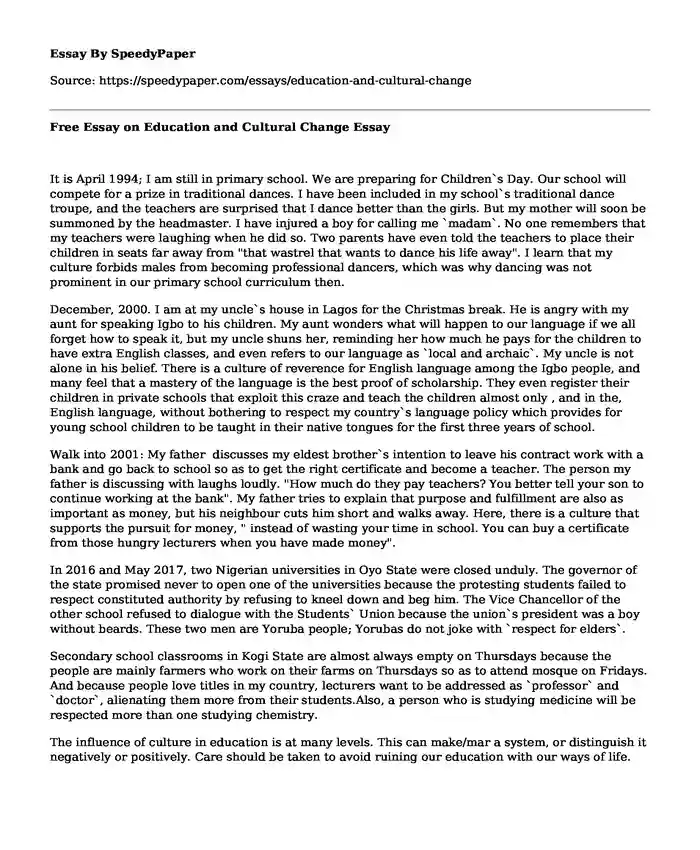It is April 1994; I am still in primary school. We are preparing for Children`s Day. Our school will compete for a prize in traditional dances. I have been included in my school`s traditional dance troupe, and the teachers are surprised that I dance better than the girls. But my mother will soon be summoned by the headmaster. I have injured a boy for calling me `madam`. No one remembers that my teachers were laughing when he did so. Two parents have even told the teachers to place their children in seats far away from "that wastrel that wants to dance his life away". I learn that my culture forbids males from becoming professional dancers, which was why dancing was not prominent in our primary school curriculum then.
December, 2000. I am at my uncle`s house in Lagos for the Christmas break. He is angry with my aunt for speaking Igbo to his children. My aunt wonders what will happen to our language if we all forget how to speak it, but my uncle shuns her, reminding her how much he pays for the children to have extra English classes, and even refers to our language as `local and archaic`. My uncle is not alone in his belief. There is a culture of reverence for English language among the Igbo people, and many feel that a mastery of the language is the best proof of scholarship. They even register their children in private schools that exploit this craze and teach the children almost only , and in the, English language, without bothering to respect my country`s language policy which provides for young school children to be taught in their native tongues for the first three years of school.
Walk into 2001: My father discusses my eldest brother`s intention to leave his contract work with a bank and go back to school so as to get the right certificate and become a teacher. The person my father is discussing with laughs loudly. "How much do they pay teachers? You better tell your son to continue working at the bank". My father tries to explain that purpose and fulfillment are also as important as money, but his neighbour cuts him short and walks away. Here, there is a culture that supports the pursuit for money, " instead of wasting your time in school. You can buy a certificate from those hungry lecturers when you have made money".
In 2016 and May 2017, two Nigerian universities in Oyo State were closed unduly. The governor of the state promised never to open one of the universities because the protesting students failed to respect constituted authority by refusing to kneel down and beg him. The Vice Chancellor of the other school refused to dialogue with the Students` Union because the union`s president was a boy without beards. These two men are Yoruba people; Yorubas do not joke with `respect for elders`.
Secondary school classrooms in Kogi State are almost always empty on Thursdays because the people are mainly farmers who work on their farms on Thursdays so as to attend mosque on Fridays. And because people love titles in my country, lecturers want to be addressed as `professor` and `doctor`, alienating them more from their students.Also, a person who is studying medicine will be respected more than one studying chemistry.
The influence of culture in education is at many levels. This can make/mar a system, or distinguish it negatively or positively. Care should be taken to avoid ruining our education with our ways of life.
Cite this page
Free Essay on Education and Cultural Change. (2017, Jul 12). Retrieved from https://speedypaper.net/essays/education-and-cultural-change
Request Removal
If you are the original author of this essay and no longer wish to have it published on the SpeedyPaper website, please click below to request its removal:
- Free Essay on Financial Accounting Reports
- Essay Example about Four Theories of Human Development
- Essay Example on the 1993 World Trade Center Terror Campaign
- Essay Sample Focusing on Religion in South Asia
- Career / Major Research Paper, Free Example
- Essay Sample: A Reflection of the "Pontius Pilate" by Ann Wroe
- Paper Example: American Indian Frontier: Hollywood and Indians
Popular categories





